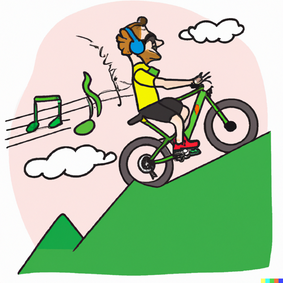 Dr. Eric Sikorski, Director of Programs & Research Dr. Eric Sikorski, Director of Programs & Research Do you listen to music while exercising? Does music make you feel stronger, faster, and/or more focused? You’re not alone, as research suggests that music can improve performance in endurance, sprint, and resistance exercise. This is due to a combination of psychological and physiological effects such as more positive affect, lower subjective fatigue, and increased cardiac output and oxygen consumption. Given this evidence, I decided to listen to music during a recent ride. On that “musical ride”, I felt more comfortable on the bike, faster on the course, and more willing to take on difficult obstacles. Time also seemed to pass quickly, and the climbs were less of a slog. While I felt different on this ride, the objective data indicated my performance (e.g., average pace, maximum speed, elevation gained) was about the same as my previous, sans music, rides. Of course, this was only one session and there are several factors that were not controlled for such as course conditions, sleep, nutrition, hydration, and even exact tire pressure. Still, the subjective feeling of awesomeness contrasted with my actual mediocre performance is worth exploring. The feeling awesome part of my ride can likely be attributed to music’s ability to elevate mood and motivate, making those uphill sections less dreadful and increasing my will to tackle a challenging section. The music may have also served as a positive distraction from my tired legs. I was, at times, in a flow state, fully immersed with a focus on the activity and a reduced self-consciousness about effective execution. There are several explanations for why the music did not result in improved performance despite the elevated feelings. While music helped me focus and be less conscious of fatigue, my skills remained at a novice level. Difficult obstacles are were difficult and time-consuming, even if I was more willing to take them on with the help of artists such as Linkin Park. The tunes may have also diverted too much attention from the task, such as not allowing for mental rehearsal as I entered a technical trail section.
Interestingly, music preference can mediate exercise performance benefits. For the ride in question, I went with a curated “mountain biking” Spotify playlist where I enjoyed some of the songs but many were skips. This may have limited the sustained benefits of music on this ride. Incidentally, reaching for the skip button on my earbuds may have created an additional distraction, reducing speed and taking me out of my flow state. While the research points to psychological and physiological benefits of listening to music while exercising, do not expect that to translate immediately into objective performance gains. To that end, there is no substitute for proper instruction (see previous musing “Can YouTube Teach Me How to Ride?”) and deliberate practice to develop your competency. Music can be a great companion as you log those hours, and a motivator as you test your skills on increasingly challenging technical sections. So keep grooving and enjoy the ride! We're going to take next week off; Happy Independence Day! We'll follow up with the final post in the series on the value of Groups in training, the following week!
0 Comments
Your comment will be posted after it is approved.
Leave a Reply. |
AuthorsThese posts are written or shared by QIC team members. We find this stuff interesting, exciting, and totally awesome! We hope you do too! Categories
All
Archives
June 2024
|


 RSS Feed
RSS Feed